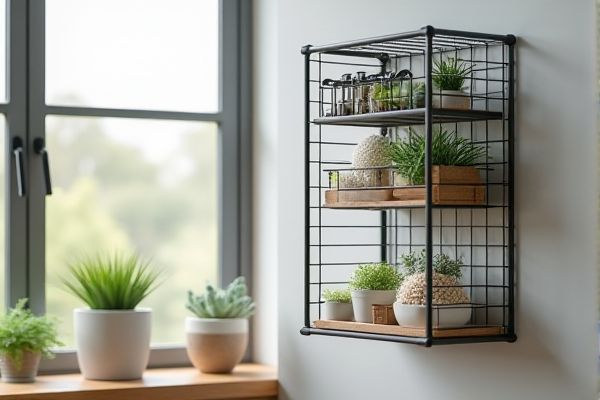
A wire organizer box offers a compact, portable solution to keep cables and chargers neatly contained in one place, while a wall-mounted organizer saves desk space by securing your cords and devices vertically for easy access. Discover which option fits your lifestyle and space by reading the rest of the article.
Table of Comparison
| Feature | Wire Organizer Box | Wall-Mounted Organizer |
|---|---|---|
| Installation | Portable, no installation required | Requires mounting on wall |
| Space Usage | Occupies desk or surface space | Saves surface space, mounts vertically |
| Capacity | Limited by box size | Varies, can be larger with shelves |
| Cable Management | Encloses wires neatly inside box | Organizes cables with hooks or clips |
| Accessibility | Easy to move and access wires | Fixed location, accessible at eye level |
| Design & Aesthetics | Compact and simple design | Customizable with different styles |
| Best Suited For | Desks, entertainment centers | Home offices, garages, workshops |
Introduction to Wire Organizer Box and Wall-Mounted Organizer
A wire organizer box provides a compact solution for neatly storing cables, power strips, and chargers, reducing clutter on your desk or floor. Wall-mounted organizers save space by holding cables, plugs, and small devices off surfaces, offering easy access while keeping your area tidy. Choosing between these depends on your available space and whether you prefer portability or fixed organization for your wires.
Key Features of Wire Organizer Boxes
Wire organizer boxes offer compact storage with multiple compartments designed for easy categorization and secure containment of cables and small electronic accessories. Their portable design allows you to conveniently transport and access your wires without tangling or damage. These boxes often feature durable materials and transparent lids, enabling quick identification of contents while keeping your workspace tidy.
Advantages of Wall-Mounted Organizers
Wall-mounted organizers maximize vertical space, reducing clutter on desks or countertops and improving workspace ergonomics. They provide easy access to wires and devices while keeping them off surfaces, enhancing cleanliness and organization. Installation flexibility allows placement near power sources and high-traffic areas, optimizing cable management efficiency.
Space Efficiency Comparison
Wire organizer boxes provide compact storage by containing cords and devices within a single enclosed unit, making them ideal for desktop or floor placement where surface space is limited. Wall-mounted organizers maximize vertical space, keeping wires off desks and floors, which frees up horizontal areas and reduces clutter in small rooms or offices. Choosing between the two depends on whether conserving desk area or utilizing wall space better suits the environment's spatial constraints.
Installation Process: Box vs Wall-Mount
Wire organizer boxes offer a straightforward installation process, typically requiring no more than placing the box on a desk or shelf, making it ideal for quick setup without tools. Wall-mounted organizers demand precise measuring, drilling, and mounting, which can be time-consuming and may require additional hardware like anchors or screws for secure attachment. The box provides portability and ease of relocation, while the wall-mounted option ensures a fixed, space-saving solution but involves a more complex installation procedure.
Cable Management and Organization
A wire organizer box offers a compact solution to conceal and bundle multiple cables, reducing clutter on your desk or floor with enclosed compartments that prevent tangling and dust accumulation. Wall-mounted organizers provide accessible cable management by elevating wires off surfaces, allowing easy identification and quick adjustments while freeing up workspace. Choosing between the two depends on your space constraints, ease of access, and the volume of cables requiring organized routing.
Safety and Accessibility Considerations
Wire organizer boxes provide enclosed storage that reduces the risk of electrical hazards by keeping cords contained and away from potential damage or accidental contact. Wall-mounted organizers offer easy accessibility and help maintain a clutter-free space by keeping cables off the floor, but require secure installation to prevent falls or injuries. You should choose based on your environment's safety needs and how frequently you need to access your cables.
Design and Aesthetic Differences
Wire organizer boxes feature a compact, enclosed design that neatly conceals cables and power strips, offering a clean and minimalistic look ideal for desktops and nightstands. Wall-mounted organizers provide an open, accessible structure with slots or hooks that keep wires visible yet orderly, blending functionality with a modern, industrial aesthetic perfect for workshops or home offices. The wire organizer box emphasizes discreetness and tidiness, whereas wall-mounted solutions prioritize easy access and spatial efficiency.
Cost Comparison and Value
A wire organizer box generally offers a lower upfront cost and flexible placement options, making it an affordable solution for managing cables and small items. Wall-mounted organizers tend to be more expensive due to installation requirements but provide long-term value by saving desk space and reducing clutter in visible areas. Your choice depends on balancing initial expense with the need for durable, efficient organization tailored to your workspace.
Choosing the Right Organizer for Your Needs
Wire organizer boxes offer compact storage for cables and small devices, ideal for desktop or drawer use, while wall-mounted organizers save space and keep cords accessible without cluttering surfaces. Your choice depends on available space, device quantity, and whether you prefer hidden storage or visible, easy access. Evaluate your workspace layout and cable management habits to select the most efficient solution.
 homyna.com
homyna.com